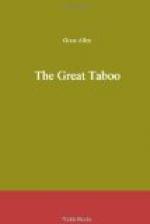Clearly, it was intended that the Korong should have no chance of escape without the knowledge of the Shadow, who, as Felix afterward learned, would have paid with his own body by a cruel death for the Korong’s disappearance.
He might as well have tried to escape his own shadow as to escape the one the islanders had tacked on to him.
All Felix’s energies were now devoted to the arduous task of discovering what Korong really meant, and what possibility he might have of saving Muriel from the mysterious fate that seemed to be held in store for them.
One evening, about six weeks after their arrival in the island, the young Englishman was strolling by himself (after the sun sank low in heaven) along a pretty tangled hill-side path, overhung with lianas and rope-like tropical creepers, while his faithful Shadow lingered a step or two behind, keeping a sharp lookout meanwhile on all his movements.
Near the top of a little crag of volcanic rock, in the center of the hills, he came suddenly upon a hut with a cleared space around it, somewhat neater in appearance than any of the native cottages he had yet seen, and surrounded by a broad white belt of coral sand, exactly like that which ringed round and protected their own enclosure. But what specially attracted Felix’s attention was the fact that the space outside this circle had been cleared into a regular flower-garden, quite European in the definiteness and orderliness of its quaint arrangement.
“Why, who lives here?” Felix asked in Polynesian, turning round in surprise to his respectful Shadow.
The Shadow waved his hand vaguely in an expansive way toward the sky, as he answered, with a certain air of awe, often observable in his speech when taboos were in question, “The King of Birds. A very great god. He speaks the bird language.”




